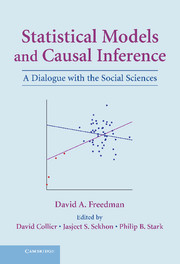Book contents
- Frontmatter
- Contents
- Preface
- Editors' Introduction: Inference and Shoe Leather
- Part I Statistical Modeling: Foundations and Limitations
- 1 Issues in the Foundations of Statistics: Probability and Statistical Models
- 2 Statistical Assumptions as Empirical Commitments
- 3 Statistical Models and Shoe Leather
- Part II Studies in Political Science, Public Policy, and Epidemiology
- Part III New Developments: Progress or Regress?
- Part IV Shoe Leather Revisited
- References and Further Reading
- Index
2 - Statistical Assumptions as Empirical Commitments
Published online by Cambridge University Press: 05 June 2012
- Frontmatter
- Contents
- Preface
- Editors' Introduction: Inference and Shoe Leather
- Part I Statistical Modeling: Foundations and Limitations
- 1 Issues in the Foundations of Statistics: Probability and Statistical Models
- 2 Statistical Assumptions as Empirical Commitments
- 3 Statistical Models and Shoe Leather
- Part II Studies in Political Science, Public Policy, and Epidemiology
- Part III New Developments: Progress or Regress?
- Part IV Shoe Leather Revisited
- References and Further Reading
- Index
Summary
Abstract. Statistical inference with convenience samples is a risky business. Technical issues and substantive issues overlap. No amount of statistical maneuvering can get very far without deep understanding of how the data were generated. Empirical generalizations from a single data set should be viewed with suspicion. Rather than ask what would happen in principle if the study were repeated, it is better to repeat the study–as is standard in physical science. Indeed, it is generally impossible to predict variability across replications of an experiment without replicating the experiment, just as it is generally impossible to predict the effect of intervention without actually intervening.
Introduction
Researchers who study punishment and social control, like those who study other social phenomena, typically seek to generalize their findings from the data they have to some larger context: In statistical jargon, they generalize from a sample to a population. Generalizations are one important product of empirical inquiry. Of course, the process by which the data are selected introduces uncertainty. Indeed, any given data set is but one of many that could have been studied. If the data set had been different, the statistical summaries would have been different, and so would the conclusions, at least by a little.
- Type
- Chapter
- Information
- Statistical Models and Causal InferenceA Dialogue with the Social Sciences, pp. 23 - 44Publisher: Cambridge University PressPrint publication year: 2009
- 6
- Cited by

